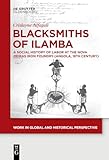Blacksmiths of Ilamba : A Social History of Labor at the Nova Oeiras Iron Foundry (Angola, 18th Century) / Crislayne Alfagali.
Material type: TextSeries: Work in Global and Historical Perspective ; 15Publisher: München ; Wien : De Gruyter Oldenbourg, [2023]Copyright date: ©2023Description: 1 online resource (XII, 386 p.)Content type:
TextSeries: Work in Global and Historical Perspective ; 15Publisher: München ; Wien : De Gruyter Oldenbourg, [2023]Copyright date: ©2023Description: 1 online resource (XII, 386 p.)Content type: - 9783110786514
- 9783110788280
- 9783110788150
- 621.932 23
- TT220 .A44 2023
- online - DeGruyter
- Issued also in print.
| Item type | Current library | Call number | URL | Status | Notes | Barcode | |
|---|---|---|---|---|---|---|---|
 eBook
eBook
|
Biblioteca "Angelicum" Pont. Univ. S.Tommaso d'Aquino Nuvola online | online - DeGruyter (Browse shelf(Opens below)) | Online access | Not for loan (Accesso limitato) | Accesso per gli utenti autorizzati / Access for authorized users | (dgr)9783110788150 |
Browsing Biblioteca "Angelicum" Pont. Univ. S.Tommaso d'Aquino shelves, Shelving location: Nuvola online Close shelf browser (Hides shelf browser)
Diss. State University of Campinas 2017.
Frontmatter -- Acknowledgments -- Contents -- List of Figures and Maps -- List of Tables and Graph -- List of Abbreviations and Acronyms -- Preliminary Notes -- Introduction -- Chapter 1 A Discontinuous Triangle: The Kingdom of Angola in the Eighteenth Century -- Chapter 2 From Ilamba to Nova Oeiras -- Chapter 3 Work and Workers in Nova Oeiras -- Chapter 4 Blacksmiths and Smelters -- Chapter 5 Successes and Failures -- Final Words -- Attachments -- Sources and Bibliography -- Glossary -- Index
restricted access online access with authorization star
http://purl.org/coar/access_right/c_16ec
This study analyzes the establishment of an iron foundry in the interior 18th-century of Angola. It was a fruit of the Portuguese Enlightenment, which encouraged investment in manufacturing, particularly of iron, a metal indispensable for military and technological purposes. However, the plans faced the resistance of African blacksmiths and founders who refused to learn foreign techniques and work processes. By emphasizing Central African agency, the book highlights the successful strategies of historical actors who scholars have largely ignored. Based upon a wide variety of sources from Brazilian, Portuguese, and Angolan archives, the book reconstructs how Africans were taken to work at the foundry and the important role they played in developing the form of production employed there. By emphasizing continuities with African technology and the quality of the iron produced, it counters interpretations of the project as an example of the failure of the Portuguese Enlightenment. The analysis demonstrates the circulation of knowledge about iron production, thus revitalizing debates that have posited knowledge transmission as unidirectional. It also highlights the relationship between local political leaders and the colonial government, in addition to elucidating the processes by which workers were organized.
Issued also in print.
Mode of access: Internet via World Wide Web.
In English.
Description based on online resource; title from PDF title page (publisher's Web site, viewed 06. Mrz 2024)









